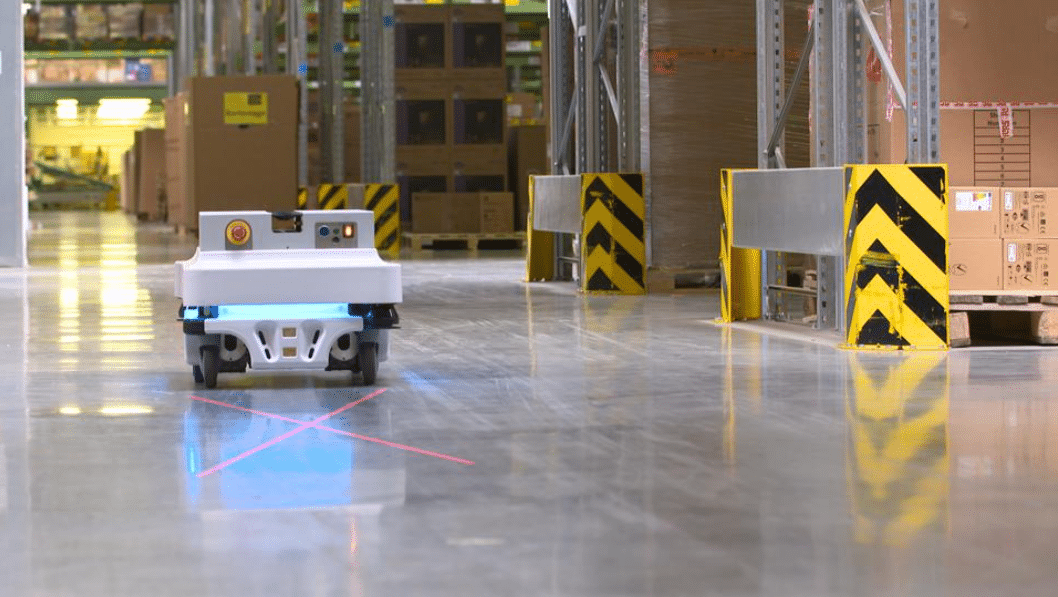Remember watching sci-fi movies where robots moved, worked, and communicated with regular humans? How “futuristic” this felt at the time. In today’s Industry 4.0 reality, robots are commonplace and populate many manufacturing and warehouse facilities around the world.
Bechtle, one of Europe’s most well-known IT service providers offering more than 40,000 hardware and software products to the industrial and public sector, is a prime example of how Industry 4.0 works in the real world.
When Bechtle set a goal to boost its e-commerce business by 250%, it required handling approximately two times as many packages. And when COVID-19 forced people to spend more time at home, the demand for home office equipment boomed.
To meet high this high demand, Bechtle needed to employ more warehouse workers to increase its delivery capacity. However, due to low unemployment in the region, finding workers was difficult. This led the innovative company to think out of the box.
Knowing that current manual warehouse processes could not support the goal, Bechtle searched for a new solution. The answer was to transform logistics services with Industry 4.0. by deploying autonomous mobile robots in its warehouse to transform supply chain operations.
The integration of robotics within its warehouse was seen as an important first step in the company’s Industry 4.0 journey.

Bridging the Gap Between Manual Processes and Automation
Bechtle recently co-innovated with SAP integrating autonomous mobile robots with SAP Extended Warehouse Management (SAP EWM).
SAP Warehouse Robotics delivers predefined scenarios that integrate autonomous mobile robots of virtually any vendor very easily. Robots navigate through the warehouse using LIDAR, laser scanners, or 3D cameras to enable simultaneous localization and mapping in a warehouse to operate safely, side by side with humans.
“With SAP Warehouse Robotics, we have found a way to manage our warehouse even more effectively and flexibly, and provide better support to our employees,” said Klaus Kratz, director of Logistics at Bechtle Logistik & Service GmbH. “Our customer promise is ‘each order should be shipped on the same day.’”
Enhancing the Customer Experience
Bechtle retains 25,000 square meters of storage area to manage, the equivalent of more than three football fields.
As a first step, the company looked at automating cross-docking operations, where goods arrive at the receiving dock and are issued directly to a customer order instead of being put away into storage. The robot moves a cart and drops it at the shipping dock. A planned second step will be the automation of put-away operations. As a result, Bechtle calculates savings of more than 30%of costs in these operations.
Automated logistics does not only shape supply chains to be leaner but also helps keep deliveries on time.
“We proved that Industry 4.0 efforts, such as adding robotics to warehouse operations, can directly enhance the customer experience as well,” said Christian Deppisch, head of Innovation Management at Bechtle Logistik & Service GmbH. “Imagine a customer orders the product at 4:00 p.m. and the product will be handed over to the carrier on the same day, despite the high level of order volumes.”
This process integration was complete in about four weeks — quite a time savings compared to traditional integration projects that can typically take up to 18 months.
Rise of Human Empowerment
Automating flexible warehouse operations makes operations much easier to maintain. The new process will help free up human employees from repetitive tasks, redeploying them to other value-added tasks, and ease their workload.
“As we were considering the logistics problem, we needed to carefully manage organizational change,” said Kratz. “We had to communicate clearly to our staff that flexible automation was the only way to meet our goals and that we would continue to value their contribution by expanding their qualification toward more demanding and customer-individual tasks, and relieving them from monotonous activities.”
Operators enjoy the freedom of leveraging robots from different suppliers, through SAP Warehouse Robotics, which makes it easy to cover spikes in demand.
In the near future, the innovative IT provider is also planning to expand the use of robotics — such as using robotic arms in operations — within its warehouse operations. By socializing robots with human employees in an integrated unified ecosystem, the company is on its way to double the revenue in the next 10 years, from €5 billion in 2020 to €10 billion in 2030.
To learn more about how to utilize Industry 4.0 to improve manufacturing processes, check out the “Building Intelligent Factories with Industry 4.0” report and watch this video to learn how Bechtle integrated robotics into warehouse operations.



